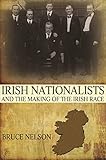Irish Nationalists and the Making of the Irish Race / Bruce Nelson.
Material type: TextPublisher: Princeton, NJ : Princeton University Press, [2012]Copyright date: ©2012Edition: Core TextbookDescription: 1 online resource (352 p.) : 22 halftonesContent type:
TextPublisher: Princeton, NJ : Princeton University Press, [2012]Copyright date: ©2012Edition: Core TextbookDescription: 1 online resource (352 p.) : 22 halftonesContent type: - 9780691161969
- 9781400842230
- Irish -- Ethnic identity
- National characteristics, Irish
- Race -- History
- HISTORY / Europe / Ireland
- African Americans
- Afro-Caribbeans
- Anglo-Irish Treaty
- Boer
- Boers
- British Empire
- British foreign policy
- Catholic Irish
- Daniel O'Connell
- Darwin
- Eamon de Valera
- England
- English
- Erskine Childers
- Frederick Douglass
- Ireland
- Irish Catholics
- Irish Parliamentary Party
- Irish Patriotic Strike
- Irish Progressive League
- Irish Republican Brotherhood
- Irish Revolution
- Irish identity
- Irish immigrants
- Irish nationalism
- Irish nationalists
- Irish nationhood
- Irish race
- Jan Christian Smuts
- Michael Davitt
- Protestant Ascendancy
- Sinn Fin
- abolition
- abolitionists
- activists
- anti-Semitism
- antislavery
- black nationalism
- dispossession
- evolution
- intellectuals
- land
- nationalist movement
- nationality
- oppression
- race
- racial discourse
- racial identity
- racialization
- republican movement
- slavery
- slaves
- socialism
- war correspondent
- 320.5409415 23
- DA925
- online - DeGruyter
- Issued also in print.
| Item type | Current library | Call number | URL | Status | Notes | Barcode | |
|---|---|---|---|---|---|---|---|
 eBook
eBook
|
Biblioteca "Angelicum" Pont. Univ. S.Tommaso d'Aquino Nuvola online | online - DeGruyter (Browse shelf(Opens below)) | Online access | Not for loan (Accesso limitato) | Accesso per gli utenti autorizzati / Access for authorized users | (dgr)9781400842230 |
Frontmatter -- Contents -- Illustrations -- Acknowledgments -- Part 1. The Making of the Irish Race -- Prologue: Arguing about (the Irish) Race -- Chapter One. "The blood of an Irishman" -- Chapter Two. Celts, Hottentots, and "white chimpanzees" -- Part 2. Ireland, Slavery, and Abolition -- Chapter Three. "Come out of such a land, you Irishmen" -- Chapter Four. "The Black O'Connell of the United States" -- Part 3. Ireland and Empire -- Chapter Five. "From the Cabins of Connemara to the Kraals of Kaffirland" -- Chapter Six. "Because we are white men" -- Part 4. Ireland and Revolution -- Chapter Seven. Negro Sinn Féiners and Black Fenians -- Chapter Eight. "The Irish are for freedom everywhere" -- Epilogue: The Ordeal of the Irish Republic -- Notes -- Index
restricted access online access with authorization star
http://purl.org/coar/access_right/c_16ec
This is a book about Irish nationalism and how Irish nationalists developed their own conception of the Irish race. Bruce Nelson begins with an exploration of the discourse of race--from the nineteenth--century belief that "race is everything" to the more recent argument that there are no races. He focuses on how English observers constructed the "native" and Catholic Irish as uncivilized and savage, and on the racialization of the Irish in the nineteenth century, especially in Britain and the United States, where Irish immigrants were often portrayed in terms that had been applied mainly to enslaved Africans and their descendants. Most of the book focuses on how the Irish created their own identity--in the context of slavery and abolition, empire, and revolution. Since the Irish were a dispersed people, this process unfolded not only in Ireland, but in the United States, Britain, Australia, South Africa, and other countries. Many nationalists were determined to repudiate anything that could interfere with the goal of building a united movement aimed at achieving full independence for Ireland. But others, including men and women who are at the heart of this study, believed that the Irish struggle must create a more inclusive sense of Irish nationhood and stand for freedom everywhere. Nelson pays close attention to this argument within Irish nationalism, and to the ways it resonated with nationalists worldwide, from India to the Caribbean.
Issued also in print.
Mode of access: Internet via World Wide Web.
In English.
Description based on online resource; title from PDF title page (publisher's Web site, viewed 29. Jul 2021)


